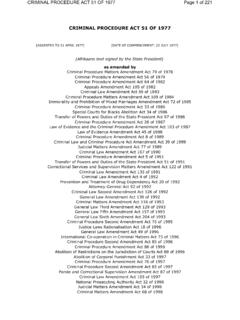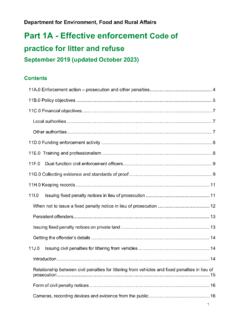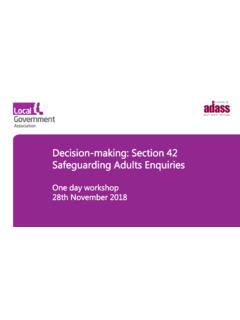Transcription of School attendance parental responsibility measures - …
1 School attendance parental responsibility measures Statutory guidance for local authorities, School leaders, School staff, governing bodies and the police January 2015 2 Contents Summary 3 About this guidance 3 Expiry or review date 3 What legislation does this guidance refer to? 3 Who is this guidance for? 3 Key points 4 Introduction 4 Purpose and scope of these legal measures 4 Context of the School attendance measures 5 School attendance Orders 6 Prosecutions by local authorities 6 Education Supervision Orders 7 Parenting Contracts 7 Parenting Orders 8 Consultation and co-operation 9 Penalty Notices 9 The Code of Conduct 9 Payment of Penalty Notices 10 Useful resources and external organisations 11 Other relevant departmental advice and statutory guidance 12 3 Summary About this guidance This is statutory guidance from the Department for Education.
2 This means that recipients must have regard to it when carrying out duties relating on Parenting Contracts, Parenting Orders and Penalty Notices. This replaces statutory guidance on Education-related parenting contracts, parenting orders and penalty notices published in September 2007. Expiry or review date This guidance will be kept under review and updated as necessary. What legislation does this guidance refer to? The Children Act 1989 (section 36); The Education Act 1996 (sections 7, 19, 436A, 437-39, 443-447); Crime and Disorder Act 1998 (section 8 -10); The Anti-social Behaviour Act 2003 (ASB Act) (sections 19-24); The Education Act 2005 (section 115); The Education and Inspections Act 2006 (sections 97-111) ; The Education (Parenting Contracts and Parenting Orders) (England) Regulations 2007; The Education (Penalty Notices) (England) Regulations 2007; The Education (Penalty Notices) (England) (Amendment) Regulations 2012; The Education (Penalty Notices) (England) (Amendment) Regulations 2013.
3 And The Education and Skills Act 2008 (section 2 and155). Who is this guidance for? This guidance is for: Local authorities; Head teachers; The police for penalty notices This guidance may also be useful for parents and carers. 4 Key points This document replaces previous guidance on Ensuring Children s Right to Education, and statutory guidance on Education-related parenting contracts, parenting orders and penalty notices published in September 2007. Introduction Local authorities and all schools have legal powers to use parenting contracts, parenting orders and penalty notices to address poor attendance and behaviour in School . In addition to using these powers, local authorities and schools can develop other practices to improve attendance .
4 Local authorities, police constables, School governing bodies, School head teachers (and staff authorised by the head) and teachers-in-charge of pupil referral units are required by law to have regard to the relevant parts of this guidance when carrying out their functions in relation to parenting contracts, parenting orders and penalty notices. This means that while the guidance does not have the force of law, there is an expectation that it will be followed unless there is good reason to depart from it. Purpose and scope of these legal measures Parenting contracts, parenting orders and penalty notices are interventions available to promote better School attendance and behaviour.
5 Good behaviour and attendance are essential to children s educational prospects. These measures are permissive and it is for individual governing bodies and local authorities to decide whether to use them. In exercising these powers governing bodies, head teachers and local authority officers should have regard to their safeguarding duties1. Parenting contracts, orders and penalty notices for irregular attendance apply only to pupils of compulsory School age who are registered at a School . Penalty notices for parents of pupils found in a public place during School hours after being excluded also apply only to children of compulsory School age who are registered at a School .
6 Parenting contracts, parenting orders and penalty notices for misbehaviour can be applied to pupils outside compulsory School age in a sixth form or maintained nursery. All schools are required by law to have a written behaviour policy (see the Department s advice on ensuring good behaviour for more details). Schools can inform parents about 1 -safeguard-children 5 their use of parenting contracts, parenting orders and penalty notices in their behaviour policy. Local authorities also have other powers to enforce School attendance where this becomes problematic, including the power to prosecute parents who fail to comply with a School attendance order, or fail to ensure their child s regular attendance at School .
7 Local authorities and schools using parenting contracts, parenting orders or penalty notices need to ensure that parents affected have access to clear, accurate information, including about their own rights and responsibilities. Definition of a parent A parent means2: All natural parents, whether they are married or not; Any person who has parental responsibility for a child or young person; and, Any person who has care of a child or young person lives with and looks after the child. The local authority and School will need to decide who comes within the definition of parent in respect of a particular pupil when using the legal measures , but generally parents include all those with day to day responsibility for a child.
8 Context of the School attendance measures Parents are responsible for making sure that their children of compulsory School age receive a suitable full-time education3. This can be by regular attendance at School , at alternative provision, or otherwise ( the parent can choose to educate their child at home). A child reaches compulsory School age on or after their fifth birthday. If they turn 5 between 1 January and 31 March they are of compulsory School age on 31 March; if they turn 5 between 1 April and 31 August they are of compulsory School age on 31 August. If they turn 5 between 1 September and 31 December, then they are of compulsory School age on 31st December.
9 A child continues to be of compulsory School age until the last Friday of June in the School year that they reach sixteen. From September 2013 4 all 16 year-olds will be 2 A s set out in section 576 of the Education Act 1996. 3 Under section 7 of the Education Act 1996. 4 Section 2 of the Education and Skills Act 2008 6 required to continue in education or training, until the end of the academic year in which they turn 17. From September 2015 they will be required to continue until their 18th birthday. School attendance Orders If it appears to the local authority that a child of compulsory School age is not receiving a suitable education, either by regular attendance at School or otherwise, then they must begin procedures for issuing a School attendance Order5.
10 The order will require the child s parents to register their child at a named School . If they fail to comply with the order the parent can be prosecuted. Prosecutions by local authorities If a child of compulsory School age fails to attend regularly at a School at which they are registered, or at a place where alternative provision is provided for them, the parents may be guilty of an offence and can be prosecuted by the local authority . Only local authorities can prosecute parents and they must fund all associated costs. Local authorities should consider the Attorney General s Guidelines for Crown Prosecutors in all prosecution cases. Local authorities must conduct all investigations in accordance with the Police and Criminal Evidence (PACE) Act 1984.















